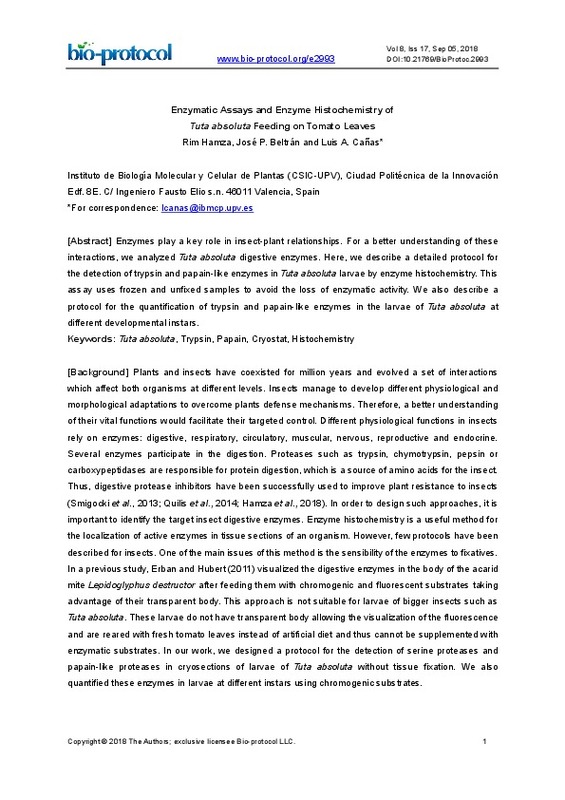JavaScript is disabled for your browser. Some features of this site may not work without it.
Buscar en RiuNet
Listar
Mi cuenta
Estadísticas
Ayuda RiuNet
Admin. UPV
Enzymatic Assays and Enzyme Histochemistry of Tuta absoluta Feeding on Tomato Leaves
Mostrar el registro completo del ítem
Hamza, R.; Beltran Porter, JP.; Cañas Clemente, LA. (2018). Enzymatic Assays and Enzyme Histochemistry of Tuta absoluta Feeding on Tomato Leaves. Bio-protocol. 8(17). https://doi.org/10.21769/BioProtoc.2993
Por favor, use este identificador para citar o enlazar este ítem: http://hdl.handle.net/10251/147628
Ficheros en el ítem
Metadatos del ítem
| Título: | Enzymatic Assays and Enzyme Histochemistry of Tuta absoluta Feeding on Tomato Leaves | |
| Autor: | ||
| Entidad UPV: |
|
|
| Fecha difusión: |
|
|
| Resumen: |
[EN] Enzymes play a key role in insect-plant relationships. For a better understanding of these interactions, we analyzed Tuta absoluta digestive enzymes. Here, we describe a detailed protocol for the detection of trypsin ...[+]
|
|
| Palabras clave: |
|
|
| Derechos de uso: | Reserva de todos los derechos | |
| Fuente: |
|
|
| DOI: |
|
|
| Editorial: |
|
|
| Versión del editor: | https://doi.org/10.21769/BioProtoc.2993 | |
| Código del Proyecto: |
|
|
| Agradecimientos: |
Rim Hamza acknowledges fellowships from the Tunisian Ministry for Higher Education and Scientific Research and from the Erasmus Mundus EMMAG program of the European Union. This work was partly supported by grants BIO2013-40747-R ...[+]
|
|
| Tipo: |
|









